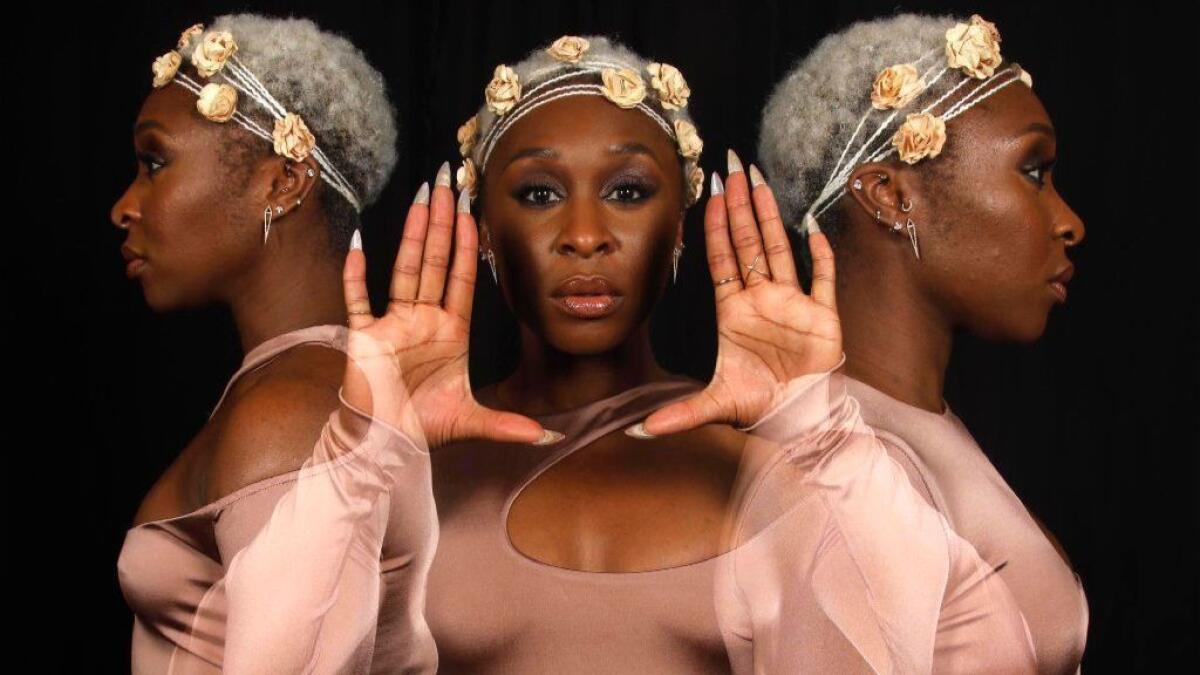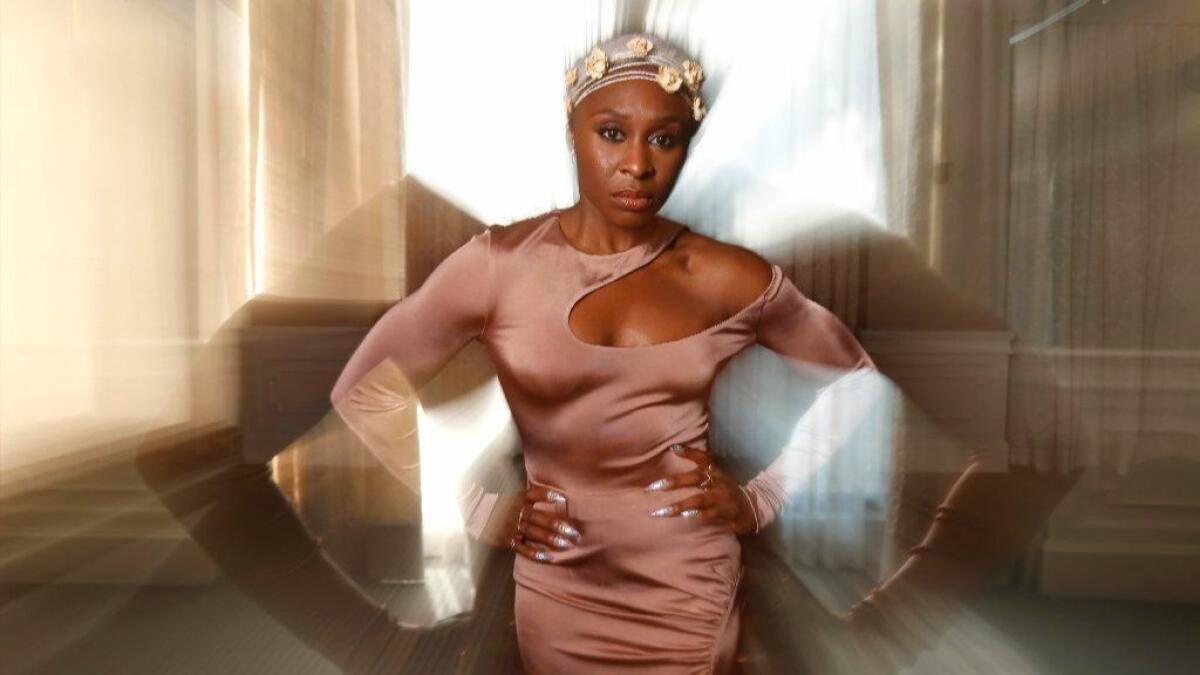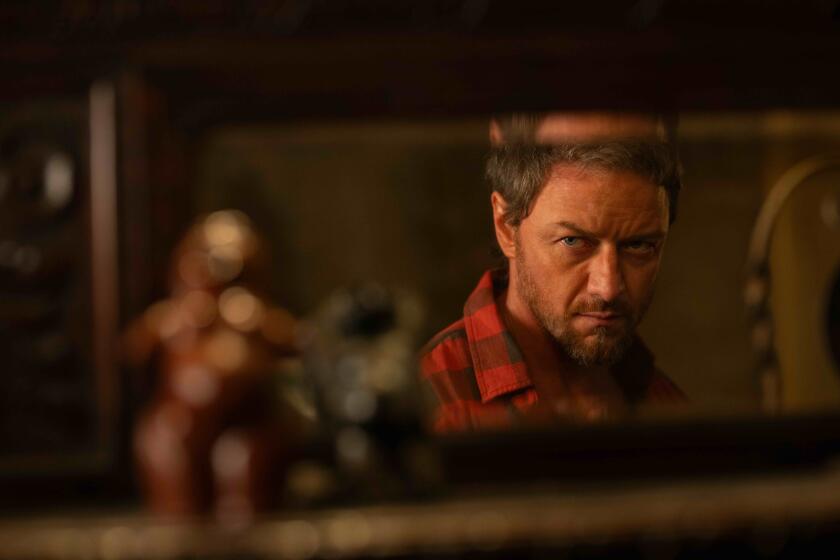Q&A: From Broadway to the big screen, ‘Widows’ star Cynthia Erivo is making moves

When Cynthia Erivo was about 15, she thought she had to choose between singing and acting.
“London is so odd that it’s hard to know really how vast the opportunity can be,” she said. “I knew I wanted to sing and I knew I had the capacity to tell stories. I just didn’t know I would have the opportunity to do both.”
At 31, she’s doing just that, happily. Audiences will get a chance to see Erivo in action this fall when the performer, known for her Tony Award-winning turn in “The Color Purple,” moves from stage to screen in her first two films.
Up first will be Drew Goddard’s “Bad Times at the El Royale” on Oct. 12. In the mystery thriller, Erivo plays former singer Darlene Sweet, one of seven strangers (including Jeff Bridges, Dakota Johnson and Jon Hamm), each with a secret, who meet at a rundown hotel in ‘60s-era Lake Tahoe.
FULL COVERAGE: 2018 fall movie preview »
A month later, on Nov. 16, Erivo shows up in Steve McQueen’s very contemporary “Widows,” about a group of women (including Viola Davis, Michelle Rodriguez and Elizabeth Debicki) who take on the criminal activities of their dead husbands.
Between automated dialogue replacement takes for “Bad Times,” The Times spoke with Erivo about her “crazy ride” of a life, making the transition from Broadway to movie theaters and her highly anticipated Harriet Tubman project.
And yes, there will be original music coming at some point, she said. “Just give me some time.”
It seems like booking the lead in the U.K. tour of “Sister Act” jumpstarted this part of your career. Do you remember what that was like?
It was six rounds of auditions for “Sister Act.” And for the final round, they asked me to learn the first 20 minutes of the show. I learned it down pat. They brought me in to perform it in front of everyone and when I finished, the director goes, “I just want to tell you ... that we are giving you the role of Sister Mary Clarence and it is OK to cry.” [laughs] Which I did, straight away.
That was probably one of the happiest moments in my life. It just felt like everything came together. It was my first big leading role with music I really liked and a director I wanted to work with. I remember feeling like I floated out into the street. And I didn’t know what to do — “Do I call my mom? Where do I go? What do I do?”

Viola Davis, Cynthia Erivo, Elizabeth Debicki and Michelle Rodriguez star in the trailer for Steve McQueen’s “Widows.”
I didn’t know I would get this kind of massive role so soon after starting movies, but here we go I guess.
— Cynthia Erivo
Do you still get that feeling now when you book things?
Oh, completely! I don’t think it will ever lose its joy because I think every little thing is another step towards doing something extraordinary. Everything that I do feels like another momentous moment. Nothing is ever small. I always joke that I’m always thrown off the deep end. With my first film, “Widows,” you’re going to throw me into a film with Viola Davis?
Which is amazing and seems like the perfect role for you...
That was another thing … .
“Widows” is your first film, and you’re starring opposite Viola Davis. How did you get the role?
[McQueen’s] casting director Francine [Maisler] had come to see me in “The Color Purple,” and I think she told him I would be great for this role and should have a meeting. So we have this breakfast meeting on a Saturday and then three weeks later I get a call. Didn’t read for it or meet with him again, and the next thing I get is a call from my agent with everyone on the line, “We’d like to let you know that you’ve just got your first movie. Steve McQueen would like …” I was, like, “What? What do you mean? How? Are you sure?”
It was all of these things happening, not by chance, but right when it needs to. “The Color Purple” happened exactly when it needed to happen and changed my entire life and continues to do so. That is a milestone, from the moment I did it in a 200-seat theater in London to doing it on Broadway to now, because it still remains one of the most incredible experiences I’ve ever had. And, I don’t know how, but it’s opened the doors to almost everything I could possibly dream of.
RELATED: Virtually every film coming out this fall »
Was transitioning formally to Hollywood with film something in your mind at the time?
I think maybe in the very far parts, all the way at the back, just because you don’t know that that’s possible. I always strove for excellence and wanted to do really well. I just didn’t know that that would be open to me, because it just wasn’t in the U.K.
I’d watch film and go, “I know I can do that.” And then it happens and you’re, like, “How did that happen?” — on the film set saying, “This is and was definitely a dream, but it’s actually happening.” I once joked with someone that I had to make new dreams because I’ve ticked off a lot of the dreams I had. So now I have to start again with a list of new things I want to do. It’s kind of awesome.

Talk to me about “Bad Times.” You were singing live on set, right?
Yes, it was one of the things [Goddard] asked for when we were reading. He wanted someone who could sing live without really needing anything done to the voice. So everything you hear throughout the movie is me live on set in that moment.
There’s one early scene in the movie that he says we did 27 takes of. I think the take in the movie is take 27. It was a case of trying to make sure everything was in sync, making sure all the moving pieces come together at the same time because it was a one-shot. And he was asking for mistakes because he said it didn’t sound like I was actually singing.
So he wanted to hear your voice crack?
Something, or repeat a line because I sounded like a recording. … So I would pick a line to repeat and put a chuckle or laugh in or change a riff. It was like getting in the mind-set of when I’m rehearsing, which is interesting to do when it’s not for real. … But I have truly enjoyed singing live. There’s something special about it and I know it’s not something done super often.
What have you learned about yourself since tackling film scripts?
I’ve learned that I am really stubborn. I like to do as much of whatever I’m doing myself. So, like, hand inserts; I’d rather do that myself instead of having a double. I think that comes from being on stage because you do everything yourself. So the inserts are mine, and if I’m running in the rain with bare feet, I’m actually the one running in the rain barefoot. If there are stunts that need to happen, I want to do them myself. I don’t want to see the back of someone else’s head that’s supposed to be mine. I realize that I’m probably a glutton for punishment, but I didn’t realize that wasn’t a thing people do.
I’ve learned that I really enjoy doing film. I’ve learned that we work really hard in very different ways in theater and film, and I’m really glad to have had experience in theater before film because I can appreciate the time you get in films when you don’t do anything. ... And that won’t always be the case, but it’s really wonderful to see how lucky you can be when you’re doing film. I love working in theater and definitely will do it again but it’s a lot of hard work. You don’t realize how much work you’re doing until you’re doing something completely different.
What can you tell me about this Harriet Tubman film you’ve been announced to star in?
That it’s definitely happening; it is about to go into pre-production and I am training for it. It is something I’m very, very excited about and slightly petrified about.
Why?
Because I really want to get it right and there are a lot of things I’m being relied on to do. And it’s a huge challenge. I didn’t know I would get this kind of massive role so soon after starting movies, but here we go, I guess.
More to Read
Only good movies
Get the Indie Focus newsletter, Mark Olsen's weekly guide to the world of cinema.
You may occasionally receive promotional content from the Los Angeles Times.











